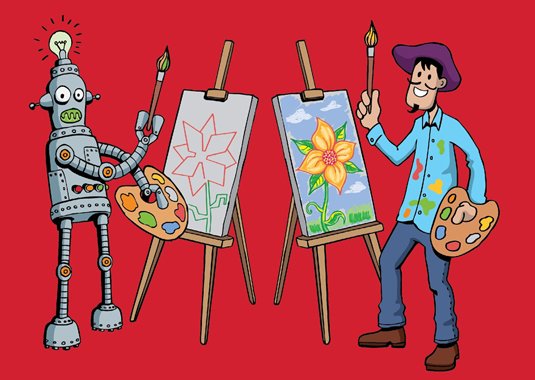In 2014, Mark Riedl of the Georgia Institute of Technology suggested that maybe it is time for a variant of the “Imitation Game”. The Imitation Game was a test created by Alan Turing to determine if machines can think like humans. Mark Riedl’s version of the test was a bit more complex than that. He suggested that we need to look at whether computers can create artwork such as poems, stories, paintings or other types of design that are valued by human evaluators. This is illustrative of how we are still concerned about robots potentially taking the work of humans someday.
Nesta recently produced a report on Creativity Vs Robots, to look at this very issue. Written by Hasan Bakhshi, Carl Benedict Frey and Michael Osborne (2015) it explores the creative economy and the future of employment. It is argued that there has been an “explosion” in interest regarding what developments in technology might mean for jobs in the workforce and how this might impact on policy.
The study found that 21 per cent of US employment is highly creative, namely the job has a likelihood of being more than 70 per cent comprised of creativity. Jobs in this field include web design, artists, architects and PR.
However, in the UK the figures are even higher, and the report found that 24 per cent of the workforce in this country are highly creative. Interestingly, the research confirmed that these creative occupations are far more likely to be future-proofed against computerisation and technology changes than other jobs. As specified in the report:
“In the US, 86 per cent of workers in the highly creative category are found to be at low or no risk of automation. In the UK, the equivalent number is 87 per cent.”
It is argued as a result that people carrying out these types of jobs in economies similar to those of the UK and USA stand little risk in the medium term of being better placed to not lose their jobs as a result of automation advances.
Overall the findings illustrate the point that when a problem is well mapped out ahead of time a machine may be able to carry out that task, even to a higher and more consistent standard than by a person.
Tasks that are suitable for this are those that can be easily measured and evaluated, and this is most likely to occur in environments that are suited to autonomous control. However, when there is not a clear outcome to be derived from the start, and where work places are very complex it is more likely that machines will not be able to take over.
Looking more closely at the geography of creativity, it was discovered that there is a big contrast between the UK as a whole and London. London was found to have 31 per cent of its work more likely to have a high creative probability. Indeed, it was found that 30 per cent of London employment could be considered to be at risk from computerisation, while this figure is higher, at 35 per cent for the rest of the UK.
This led the authors to the conclusion that the creative workforce in London is more secure than other workforces in other parts of the UK. It is also argued that the UK will need to make sure that it is continually working on creating new jobs in the creative fields to be able to maintain a competitive edge over other countries, particularly the USA and Asian countries.
The report demonstrates that as per other research findings, the scope for automation has grown and is likely to continue to grow in the future. However, creativity presents problems for automation. On the other hand it is also worth acknowledging the role that computers play in some of the creative industries.
As argued, musicians increasingly use computer technology to create their works, and software is also used by architects to create plans for development. The finding here is that computer related technologies will replace some professions, but for those in the creative field they are likely to enhance what these workers do, by providing a new range of tools to be creative with.
The automated Workplace – Robots in the rise – infographic by Focus

Paula Newton is a business writer, editor and management consultant with extensive experience writing and consulting for both start-ups and long established companies. She has ten years management and leadership experience gained at BSkyB in London and Viva Travel Guides in Quito, Ecuador, giving her a depth of insight into innovation in international business. With an MBA from the University of Hull and many years of experience running her own business consultancy, Paula’s background allows her to connect with a diverse range of clients, including cutting edge technology and web-based start-ups but also multinationals in need of assistance. Paula has played a defining role in shaping organizational strategy for a wide range of different organizations, including for-profit, NGOs and charities. Paula has also served on the Board of Directors for the South American Explorers Club in Quito, Ecuador.












